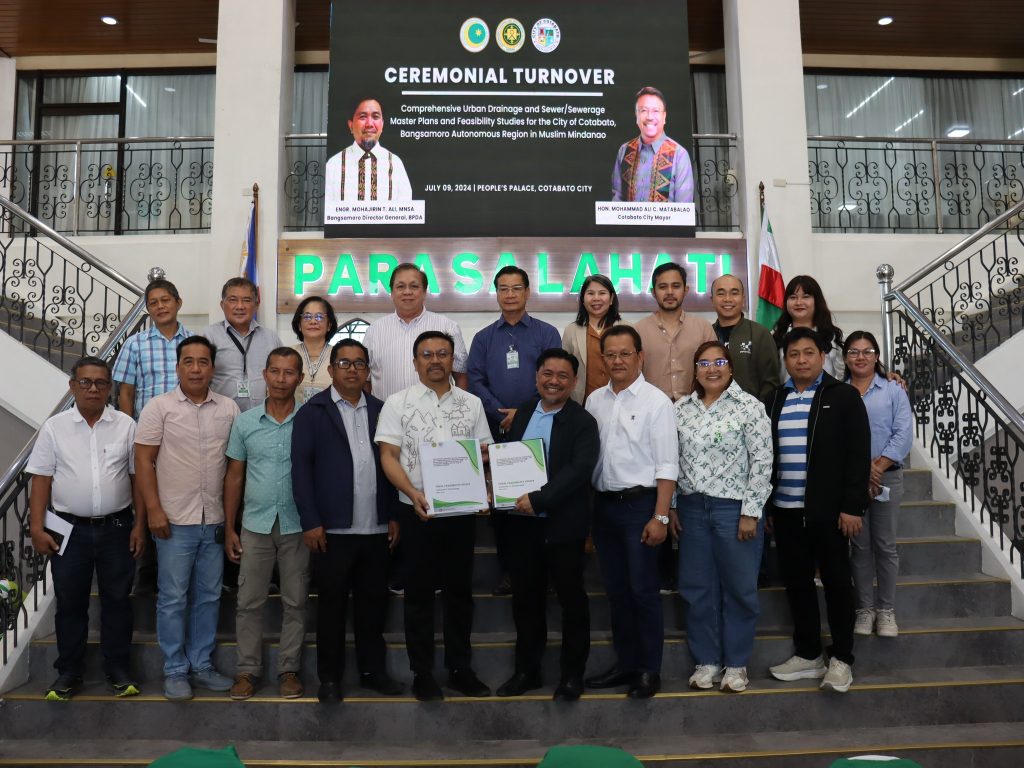
COTABATO CITY – BPDA Director General Engr. Mohajirin T. Ali, MNSA, officially turned over the “Comprehensive Urban Drainage and Sewer/Sewerage Master Plans and Feasibility Studies for the City of Cotabato” to Cotabato City Mayor Mohammad Ali ‘Bruce’ Matabalao during a ceremonial turnover at the People’s Palace on Tuesday, July 9.
In his address, DG Ali emphasized that these plans and studies demonstrate the BPDA’s commitment to rigorous, data-driven analysis and evidence-based strategies, which are essential for guiding the agency’s planning efforts for the BARMM.
“I am elated by this significant milestone, which provides a clear roadmap for essential interventions to strengthen the city’s flood management capabilities and improve its sanitation infrastructure,” DG Ali said.
The Drainage Master Plan aims to enhance the city’s drainage infrastructure to effectively manage stormwater runoff and mitigate flood risks, with the key objective of establishing a sustainable and climate-resilient system. Meanwhile, the Sewerage Master Plan is a comprehensive strategy designed to provide an appropriate sewerage infrastructure system in Cotabato City, aligning with the sanitation goals of the national government and the United Nations.
DG Ali underscored that the implementation of these proposed interventions requires cooperation and support from the City Government of Cotabato, Bangsamoro government, national government, and donor partners.
“These studies also propose institutional arrangements and financing options for the implementation of priority interventions, recognizing that the City of Cotabato cannot undertake this effort alone,” he stressed.
Mayor Matabalao expressed his heartfelt gratitude to BPDA, CEST Incorporated, Falcon Geoenvironmental Service Co., and all other partners who have worked tirelessly on this project, highlighting their shared commitment to the development of Cotabato City and the entire BARMM.
“As we officially receive these master plans and feasibility studies, let us commit ourselves to their effective implementation. It is our responsibility to transform these plans into tangible actions that will benefit our city and its residents. By doing so, we are not only investing in infrastructure but also in the future well-being and prosperity of Cotabato City,” he stated.
The mayor also emphasized that the plans will serve as blueprints for the future of Cotabato City, underlining that the proactive measures and strategic planning detailed in the plans will help mitigate flooding, enhance sanitation, and contribute to the overall resilience of the city.
“They outline our path towards improved urban infrastructure, ensuring efficient drainage and sewerage systems that are crucial for public health and environmental sustainability,” Matabalao added.
Director General Engr. Danilo Ong, the Officer-in-Charge of the Ministry of Public Works, urged all residents of Cotabato City to work together with the city government by avoiding the indiscriminate disposal of garbage. He stressed that improper waste management, particularly waste disposal that causes blockages or clogs in drainage systems, results in flash floods and disrupts the flow of traffic.
“Let us unite and work together to keep our city clean and safe for everyone. We are delighted to see these collective efforts gaining ground and reaching a significant milestone in the advancement of this development project,” he said.
The engagement of the BPDA and the City Government of Cotabato with leading consultants from CEST Incorporated and Falcon Geoenvironmental Service Co. resulted in the development of the master plans and feasibility studies.
According to the assessment of the existing drainage system and proposed engineering interventions conducted by the two consulting firms, Cotabato City faces persistent flooding challenges due to various factors, including its low-lying geography within the expansive Mindanao River Basin, deficient drainage infrastructure, deforestation, climate change impacts, urban planning shortcomings, and sediment accumulation in rivers.
To address these challenges, the studies recommend drainage network upgrades and rehabilitation for both natural and man-made channels based on field assessments and hydraulic capacity analyses to enhance the drainage system and mitigate flooding in the city.
Specific recommendations include maintenance and improvement of dysfunctional conveyance systems, increasing the drainage capacity of major channels and cross-drainage structures, enhancing natural stream and channel capacity for drainage improvement, constructing detention facilities in open and public spaces, properly managing solid waste to prevent drainage structure clogging, improving city land use planning to avoid flood-prone areas, and reducing peak flow rates through Sustainable Urban Drainage Structures (SUDS) to maximize rainfall infiltration.
The studies also propose land use planning and zoning; flood forecasting, early warning, and emergency response; post-disaster recovery; clearing of rivers and creeks; construction of a drainage network system; construction of detention basins at strategic locations; adoption of Sustainable Urban Drainage Systems (SUDS); introduction of a Rainwater Harvesting System to households; and watershed protection and rehabilitation. These non-structural measures will aid the drainage system in flood management and require cooperation from both the local government unit and the community for effective implementation.
Moreover, the event was attended by officials and employees from the City Government of Cotabato, BPDA, and MPW, as well as consultants from CEST Incorporated and Falcon Geoenvironmental Service Co., and other stakeholders. (𝙈𝙖𝙧𝙮 𝙇𝙤𝙫𝙚𝙡𝙡𝙖 𝙇𝙖𝙤-𝙇𝙖𝙨𝙩𝙞𝙢𝙤𝙨𝙖 / 𝘽𝙋𝘿𝘼-𝘽𝘼𝙍𝙈𝙈)



